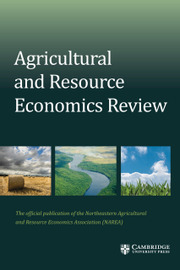Crossref Citations
This article has been cited by the following publications. This list is generated based on data provided by
Crossref.
Mollinga, Peter P
2001.
Water and politics: levels, rational choice and South Indian canal irrigation.
Futures,
Vol. 33,
Issue. 8-9,
p.
733.
Madhoo, Yeti Nisha
2004.
Political economy of water pricing policy: Empirical evidence from public utilities in Mauritius.
Water Resources Research,
Vol. 40,
Issue. 7,
Tiller, Kelly J.
and
Jakus, Paul M.
2005.
Applying the Miceli Model to Explain Cooperation in Municipal Solid Waste Management.
Agricultural and Resource Economics Review,
Vol. 34,
Issue. 2,
p.
217.
Pitafi, Basharat A.
and
Roumasset, James A.
2009.
Pareto‐Improving Water Management over Space and Time: The Honolulu Case.
American Journal of Agricultural Economics,
Vol. 91,
Issue. 1,
p.
138.
Hötzl, H.
Guttman, J.
Salameh, E.
and
Tamimi, AR.
2009.
The Water of the Jordan Valley.
p.
481.
Malul, Miki
Bar-El, Raphael
and
Schwartz, Dafna
2010.
Patterns of Cooperation in High-Tech—Constraints, Feasibility, and Benefits: Results of a Study among Palestinians and Israelis.
Conflict Management and Peace Science,
Vol. 27,
Issue. 1,
p.
67.
Browning‐Aiken, Anne
Morehouse, Barbara J.
Nikitina, Elena
Lebel, Louis
Kotov, Vladimir
Sinh, Bach Tan
Hernandes, André
Dolinaj, Dragan
Pantelić, Milana
Bejko, Djana
Bushati, Brilanda
Shumka, Spase
Nagothu, Udaya Sekhar
Skarbøvik, Eva
Perovic, Andrej
Mali, Sotir
Appelgren, Bo
Teasley, Rebecca L.
McKinney, Daene C.
Eleftheriadou, Eleni
Mylopoulos, Yannis
Atwi Saab, Majed
and
Sánchez Chóliz, Julio
2011.
Transboundary Water Resources Management.
p.
275.
Ewert, Stefan
2011.
Regional higher education co-operation: a research proposal to compare the Baltic Sea and the Black Sea regions.
The Romanian Journal for Baltic and Nordic Studies,
Vol. 3,
Issue. 2,
p.
199.
Dinar, Ariel
and
Nigatu, Getachew S.
2013.
Distributional considerations of international water resources under externality: The case of Ethiopia, Sudan and Egypt on the Blue Nile.
Water Resources and Economics,
Vol. 2-3,
Issue. ,
p.
1.
Esteban, Encarna
and
Dinar, Ariel
2013.
Cooperative Management of Groundwater Resources in the Presence of Environmental Externalities.
Environmental and Resource Economics,
Vol. 54,
Issue. 3,
p.
443.
Shi, Guang-Ming
Wang, Jin-Nan
Zhang, Bing
Zhang, Zhe
and
Zhang, Yong-Liang
2016.
Pollution control costs of a transboundary river basin: Empirical tests of the fairness and stability of cost allocation mechanisms using game theory.
Journal of Environmental Management,
Vol. 177,
Issue. ,
p.
145.
Sidibé, Yoro
and
Williams, Timothy O.
2016.
Agricultural land investments and water management in the Office du Niger, Mali: options for improved water pricing.
Water International,
Vol. 41,
Issue. 5,
p.
738.
Bekchanov, Maksud
Sood, Aditya
Pinto, Alisha
and
Jeuland, Marc
2017.
Systematic Review of Water-Economy Modeling Applications.
Journal of Water Resources Planning and Management,
Vol. 143,
Issue. 8,
Khachaturyan, Marianna
and
Schoengold, Karina
2019.
Applying Interconnected Game Theory to Analyze Transboundary Waters: A Case Study of the Kura–Araks Basin.
Water Economics and Policy,
Vol. 05,
Issue. 01,
p.
1850016.
2021.
The Economics of Water Resources.
p.
190.
Peng, Xiang
and
Li, Nannan
2022.
Water Pricing Mechanism for China's South‐to‐North Water Diversion Project: Design, Evaluation, and Suggestions.
JAWRA Journal of the American Water Resources Association,
Vol. 58,
Issue. 6,
p.
1230.
Gómez, Rosario
and
Weikard, Hans-Peter
2023.
Cooperative water-sharing agreements between highlands and drylands: the Tambo-Santiago-Ica river basin in Peru.
International Journal of Water Resources Development,
Vol. 39,
Issue. 5,
p.
796.


